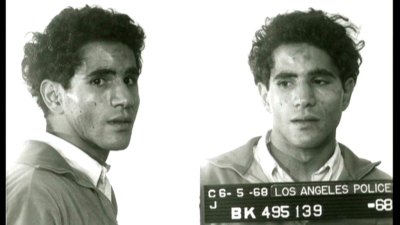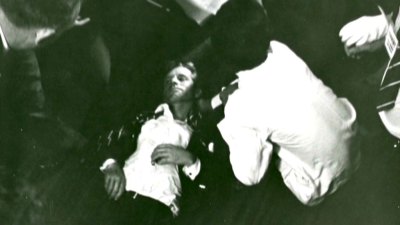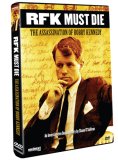| Reviews & Columns |
|
Reviews DVD TV on DVD Blu-ray 4K UHD International DVDs In Theaters Reviews by Studio Video Games Features Collector Series DVDs Easter Egg Database Interviews DVD Talk Radio Feature Articles Columns Anime Talk DVD Savant Horror DVDs The M.O.D. Squad Art House HD Talk Silent DVD
|
DVD Talk Forum |
|
|
| Resources |
|
DVD Price Search Customer Service #'s RCE Info Links |
|
Columns
|
|
|
RFK Must Die - The Assassination of Bobby Kennedy
RFK Must Die: The Assassination of Bobby Kennedy, a new investigative documentary by Shane O'Sullivan, looks at the infamous 1968 murder of the Massachusetts Senator and Presidential hopeful, raising some interesting questions about the official version of what happened. Nonetheless, the many suppositions that are thrown out by O'Sullivan, though tantalizing and perhaps plausible, still aren't adequately supported, creating yet another layer of haze over a historical event that will most likely never be fully understood.

Robert Kennedy, having just won the California primary in his bid for the Democratic nomination for President, was shot on June 5, 1968, in a small kitchen pantry at the Ambassador Hotel in Los Angeles, California. Sirhan Sirhan, a 24-year-old Palestinian, was witnessed firing a pistol at Kennedy, and wrestled to the ground. Sirhan, who later confessed to the crime (only to later still denounce that confession) was convicted of murder and sentenced to life in prison, where he remains today. And those are about the only concrete details that any two historians or assassination buffs can agree upon when it comes to that moment in history.
O'Sullivan's contention seems to be that CIA operatives, including the notorious field agent, David Morales, were present at the Ambassador Hotel during the assassination attempt, giving further credence to the already popular conspiracy theory that a second gunman was involved in Kennedy's assassination. First looking at the forensics of the actual shooting, O'Sullivan explores, through various witnesses, the inconsistencies in the official LAPD investigative report, versus the autopsy report by Los Angeles coroner Dr. Thomas Noguchi (no stranger to controversy himself). According to Noguchi's report, the fatal shot to Kennedy's head indicated an extremely close firing range, perhaps no more than an inch or two. However, most eyewitnesses place Sirhan Sirhan a foot to six feet away from Kennedy when the shots rang out.
As well, there's some evidence that more than eight shots were fired during the assault (Sirhan's revolver had an eight shell capacity), and that evidence to this effect (unaccounted bullet holes in the ceiling and door casings, as well as bullet trajectories through bodies and clothing) has been intentionally lost or destroyed. Eyewitness testimony (that was later, perhaps, suppressed) suggests that there may have been individuals fleeing the pantry who admitted to the killing (the infamous "girl in the polka dot dress" who supposedly exclaimed to an eyewitness, "We've shot Kennedy!"). Many of these loose ends appear to remain unexamined by police authorities to this day, fueling further speculation that there is indeed a conspiracy involved with the Robert Kennedy assassination.
And from that beginning of RFK Must Die: The Assassination of Bobby Kennedy, O'Sullivan is quite persuasive that at the very least, there are inconsistencies in the official investigative report that should be pursued. And to O'Sullivan's credit, when he does find a witness whose testimony seems to contradict O'Sullivan's theory - waiter Vincent Di Pierro - he's honest enough to allow Di Pierro to speak, and acknowledges that Di Pierro's account of the murder seems sincere (Di Pierro insists that Sirhan was much closer to Kennedy, with arm extended, and that Kennedy turned, thereby conforming to the autopsy report). It's apparent, though, that he doesn't believe Di Pierro (and says so on film, although he doesn't openly question the other witnesses, some quite questionable in their veracity, as he does Di Pierro).
Where RFK Must Die: The Assassination of Bobby Kennedy gets into trouble is in the largely unsubstantiated (although entirely plausible) claims that Sirhan Sirhan was a "Manchurian candidate," a programmed assassin, who, guided by controllers (perhaps the "girl in the polka dot dress"?), served as the fall guy for the real assassin (assuming there was a second gunman). The widely discussed theory is that Sirhan was used by the CIA (or more accurately, independently operating agents within the Agency) to exact revenge on the Kennedy brothers for their roles in the Bay of Pigs fiasco. The theory proposes that agents involved in training and running the Cuban nationals who hoped to overthrow Communist dictator Fidel Castro, specifically the legendary spook, David Morales, despised the Kennedys for pulling the rug out from under these fighters by denying air support at the last minute, ensuring a massacre for the CIA operation.
O'Sullivan links this familiar conspiracy theory with the Robert Kennedy assassination, by claiming to spot Morales, as well as agents Gordon Campbell and George Joannides, in the extensive photographic coverage and newsreel footage that marked the Robert Kennedy murder (in addition to numerous sources for still photographers, newsreels and a live studio feed from various CBS cameras were running during and after the assassination). He pulls acquaintances and former colleagues who, on camera, claim (to a level of certainty, it's important to note) that the figures spotted throughout the Ambassador are indeed the named CIA operatives (who, it should be noted, were all officially stationed in Southeast Asia at the time of the assassination according to the CIA and other sources).
Addressing the first part of O'Sullivan's thesis - Sirhan as the "Manchurian candidate" - O'Sullivan offers interesting, but totally unsubstantiated suppositions that amount to a hill of beans as far as real, concrete facts and evidence. Trying to establish that Sirhan wasn't capable of killing Kennedy without mind-control programming, the questionable Robert Blair Kaiser, an author and defense team investigator, is featured; he claims, rather ridiculously, that Sirhan didn't possess the necessary "macho assassin" character makeup to take on Kennedy. What that term even means is beyond me, but the notion that someone has to be "macho" or a hard-ass to kill someone isn't even worth discussing. More importantly, a claim is put forth by Kaiser, as well as Dr. Herbert Spiegel (who, significantly, has never examined Sirhan, but is going by case notes from another physician), that since Sirhan can't remember the crime, even under hypnosis, then he must be brainwashed (which of course ignores the obvious: Sirhan could just be lying about that).
O'Sullivan is careful enough to recount how Sirhan's personality significantly changed due to a severe head injury (his brother, Munir, strongly bolsters this claim), lending credence to the fact that Sirhan absolutely could - and indeed still may - suffer from mental illness, and an inability to remember his actions that fateful night. As well, all the damming evidence of Sirhan's actions prior to the murder (including notebooks that indicated he wanted RFK to die for supporting Israel), are carefully delineated. Yet O'Sullivan abandons this balance when he goes on a bit about programming, having Kaiser and Spiegel (who's in no position to actually comment on what may or may not have happened to Sirhan) speak about Sirhan as if the notion of his programming is already settled. The supporting evidence includes tapes of Sirhan's hypnosis sessions with Dr. Diamond (which frequently sound more like those notorious "recovered memory" sessions that lead a lot of people to seriously question the viability of testimony based on hypnosis), as well as a cursory introduction to the late Dr. William J. Bryan, a former government official involved with the Army's brainwashing program during the Korean War. Evidently, Bryan once claimed - to two prostitutes - that he brainwashed Sirhan. Of course, that's hearsay (we don't even see who recounted that story) and totally unsubstantiated, and quite frankly, not worthy of being included here without some more supporting evidence. Despite all the talk of programming, the far more plausible explanation is that Sirhan, deeply troubled, was more than capable of killing Kennedy (shadowy defense investigator Michael McCowan not only states that Sirhan admitted to him that he killed Kennedy, but that he was stalking Hubert Humphrey as well, just week prior to June 5th).
As for O'Sullivan's belief that the three men who keep popping up in the films and photos at the Ambassador Hotel that night, it is compelling that several former colleagues I.D. the figure O'Sullivan labels as Morales. Still, not one of the witnesses says with 100% certainty that he is indeed Morales, and one witness, Morales' best friend, flat out states it's not (although, to be fair, he may have ulterior motives for denying it). While I realize it's totally unscientific, I have to admit that looking at the various photos of Morales in comparison to the Ambassador film footage, they didn't look like the same man at all to me. And most telling, O'Sullivan ends the documentary on a remarkably honest note, saying he has no idea if the other two men tentatively identified as Joannides and Campbell, are indeed those agents (the evidence seems more strongly pointed towards them being simple watch salesmen from the Bulova company - seriously; if the one man was truly covert operative Campbell, would he really make a point of quite conspicuously waving to a TV camera for several seconds, to make sure he's noticed?).
One might assume that O'Sullivan, an obvious Robert Kennedy fan, may have allowed his admiration for the Senator to bias the film towards this particular conspiracy theory. His opening take on Kennedy is entirely laudatory, whitewashing Kennedy's own culpability in covert shenanigans, including his shameful decision not to support his own operatives in the Bay of Pigs fiasco. Dr. Martin Luther King is shown often in the film, linking the civil rights leader to Robert Kennedy's efforts on behalf of the movement, but no mention is made of Kennedy's written okay to J. Edgar Hoover to track King's movements and bug King's phones (O'Sullivan also overstates the supposed ease with which Robert Kennedy would have eventually taken the White House, when in fact he would still have probably lost the nomination to political machine vet Humphrey). But to his great credit, O'Sullivan admits at the final fade-out that he may be just as much in the dark about what happened on June 5, 1968, as when he started RFK Must Die: The Assassination of Bobby Kennedy.

The DVD:
The Video:
The anamorphically enhanced, 1.78:1 widescreen image for RFK Must Die: The Assassination of Bobby Kennedy is quite good, with a sharp picture and the older newsreel footage properly window-boxed.
The Audio:
The Dolby Digital English 2.0 stereo audio mix is entirely adequate for this dialogue-driven doc.
The Extras:
Included here are ten-and-a-half-minutes worth of vintage Robert Kennedy campaign television ads. As well, there's a ten-minute audio interview with Sirhan, from the original criminal investigation.
Final Thoughts:
Writer/director Shane O'Sullivan does an excellent job in bringing up some of the contradictions in the official investigation of the Robert Kennedy assassination. But as tantalizing (and plausible) as his theory is about Sirhan Sirhan's role as a "Manchurian candidate," programmed to kill and forget, as well as his conclusion that cover CIA agents were present at the Ambassador Hotel the night of the shooting, the evidence gathered is far from conclusive - which O'Sullivan, to his credit, admits. Conspiracy enthusiasts and historians will enjoy RFK Must Die: The Assassination of Bobby Kennedy; I recommend it.
Paul Mavis is an internationally published film and television historian, a member of the Online Film Critics Society, and the author of The Espionage Filmography.


|
| Popular Reviews |
| Sponsored Links |
|
|
| Sponsored Links |
|
|
| Release List | Reviews | Shop | Newsletter | Forum | DVD Giveaways | Blu-Ray | Advertise |
|
Copyright 2024 DVDTalk.com All Rights Reserved. Legal Info, Privacy Policy, Terms of Use,
Manage Preferences,
Your Privacy Choices | |||||||














